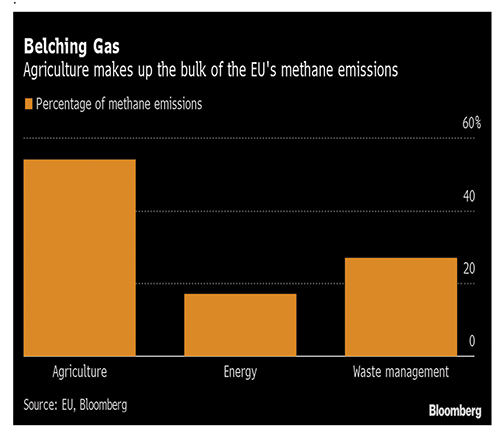The draft Methane Action Plan mostly lists existing policies and proposals. To fulfill its 30% reduction commitment the EU must include action to slash the use of fossil fuels and reduce meat consumption.
At last year’s climate summit in Glasgow (COP26) a range of countries, including the EU and its member states, subscribed to the Global Methane Pledge. Through this voluntary pledge, the EU committed to reduce methane emissions by 30% between 2020 and 2030. While the EU has substantially reduced its methane emissions already (-36% between 1990 and 2020), it does not (yet) have the policies in place to fulfil this commitment under the Global Methane Pledge. If the EU is serious about this pledge it would need to adopt much more stringent policies to a) phase out coal (by 2030) and fossil gas (by 2035), and b) substantially reduce meat production and consumption. The EU Methane Action Plan, identifying the EU’s contribution to the Global Methane Pledge, should be the opportunity to do so.
It is clear that in order to prevent dangerous climate change all greenhouse gases need to be substantially reduced. To achieve the 2015 Paris Agreement’s target to limit temperature rise to 1.5°C, it is assumed that all greenhouse gases in the EU would need to be reduced by at least 65% by 2030 (as compared to 1990) and reach net zero by 2040. This will be a challenge for all greenhouse gases and thus any action focusing on reducing methane emissions should ensure it also contributes to stringent reductions of CO₂ and other greenhouse gases.
At the moment, the assessment is that future reductions in methane emissions will be harder than those for other gases. The draft EU Methane Action Plan foresees that while implementing all measures proposed in the Fit for 55 package and the European Green Deal, methane emissions in 2030 will be close to 50% of 1990 emissions, requiring a reduction in methane emissions of 23% between 2020 and 2030. One would thus expect that the Methane Action Plan would go beyond just providing an overview of existing policies and proposals (which include the Commission’s Methane Strategy and the proposed Regulation on Methane Emissions from the Energy Sector).
Most of the reductions described in the Action Plan will happen in the energy and waste sectors, while the biggest gains in reducing methane emissions are actually to be made in the agricultural sector. Currently this sector is responsible for 54% of all methane emissions while the waste management and energy sectors are responsible for 27% and 17% of emissions respectively (see graph below).
Methane emissions from the energy sector have been reduced by 60% already and are scheduled to be reduced by another 30% (between 2020 and 2030). However as the bulk of the energy sector’s methane emissions are linked to the extraction of coal and to the production and distribution of oil and gas, much more than 30% can be achieved by ensuring a full phase-out of coal use in the EU by 2030 and the phase-out of gas and oil by 2035 and 2040 respectively. In other words, by developing and implementing EU-wide fossil fuel phase-out strategies the EU could probably reduce methane emissions in the energy sector close to zero within the next decade.
EU methane emissions from the agricultural sector, which almost all stem from livestock, have not reduced over the last 10 years. This needs to change. The Methane Action Plan thus needs to provide additional incentives to reduce methane emissions in the livestock sector, in particular by ensuring reductions in meat and dairy consumption and production. Only substantial changes in people’s diets will allow the EU to fulfil its obligations under the Global Methane Pledge.
This is also one of the recommendations of the IPCC’s 2020 Special Report on Climate Change and Land: “Balanced diets, featuring plant-based foods, such as those based on coarse grains, legumes, fruits and vegetables, nuts and seeds, and animal-sourced food produced in resilient, sustainable and low-greenhouse gas emission systems, present major opportunities for adaptation and mitigation while generating significant co-benefits in terms of human health. By 2050, dietary changes could free several million square kilometres of land and provide a technical mitigation potential of 0.7 to 8.0 GtCO₂eq per year, relative to business as usual projections.”
It is high time the EU integrates these IPCC recommendations into its agricultural policies.
Wendel Trio
































